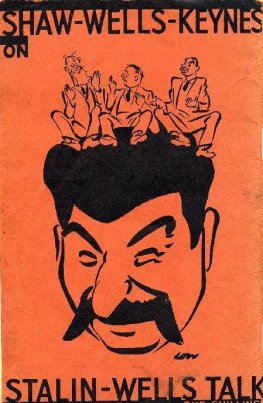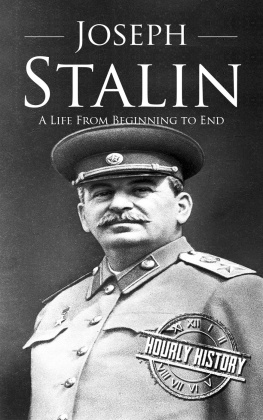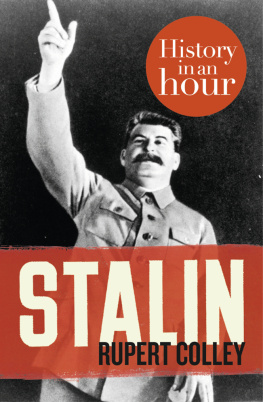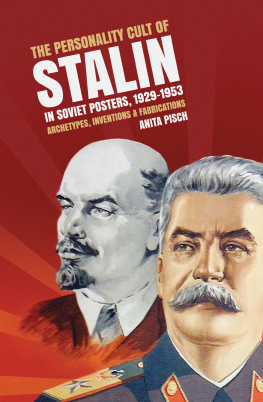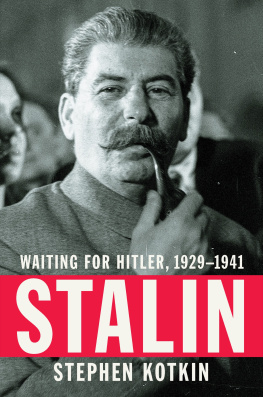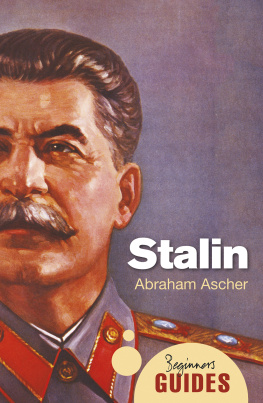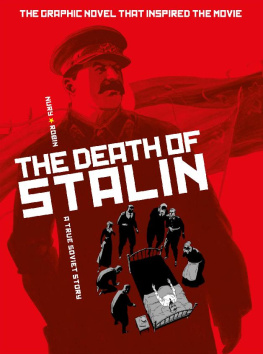Joseph Stalin - Marxism VS. Liberalism: An Interview
Here you can read online Joseph Stalin - Marxism VS. Liberalism: An Interview full text of the book (entire story) in english for free. Download pdf and epub, get meaning, cover and reviews about this ebook. City: New York, year: 1950, publisher: New Century Publishers, genre: Non-fiction. Description of the work, (preface) as well as reviews are available. Best literature library LitArk.com created for fans of good reading and offers a wide selection of genres:
Romance novel
Science fiction
Adventure
Detective
Science
History
Home and family
Prose
Art
Politics
Computer
Non-fiction
Religion
Business
Children
Humor
Choose a favorite category and find really read worthwhile books. Enjoy immersion in the world of imagination, feel the emotions of the characters or learn something new for yourself, make an fascinating discovery.
- Book:Marxism VS. Liberalism: An Interview
- Author:
- Publisher:New Century Publishers
- Genre:
- Year:1950
- City:New York
- Rating:4 / 5
- Favourites:Add to favourites
- Your mark:
- 80
- 1
- 2
- 3
- 4
- 5
Marxism VS. Liberalism: An Interview: summary, description and annotation
We offer to read an annotation, description, summary or preface (depends on what the author of the book "Marxism VS. Liberalism: An Interview" wrote himself). If you haven't found the necessary information about the book — write in the comments, we will try to find it.
Marxism VS. Liberalism: An Interview — read online for free the complete book (whole text) full work
Below is the text of the book, divided by pages. System saving the place of the last page read, allows you to conveniently read the book "Marxism VS. Liberalism: An Interview" online for free, without having to search again every time where you left off. Put a bookmark, and you can go to the page where you finished reading at any time.
Font size:
Interval:
Bookmark:
Joseph Stalin and H. G. Wells
MARXISM vs. LIBERALISM
An Interview
WELLS: I am very much obliged to you, Mr. Stalin, for agreeing to see me. I was in the United States recently. I had a long conversation With President Roosevelt and tried to ascertain what his leading ideas were. Now I have come to you to ask you what you are doing to change the world
STALIN: Not so very much
WELLS: I wander around the world as a common man and, as a common man, observe what is going on around me.
STALIN: Important public men like yourself are not common men. Of course, history alone can show how important this or that public man has been; at all events you do not look at the world as a common man.
WELLS: I am not pretending humility. What I mean is that I try to see the world through the eyes of the common man, and not as a party politician or a responsible administrator. My visit to the United States excited my mind. The old financial world is collapsing; the economic life of the country is being reorganized on new lines. Lenin said: We must learn to do business, learn this from the capitalists. Today the capitalists have to learn from you, to grasp the spirit of socialism. It seems to me that what is taking place in the United States is a profound reorganization, the creation of planned, that is, socialist, economy. You and Roosevelt begin from two different starting points. But is there not a relation in ideas, a kinship of ideas, between Washington and Moscow? In Washington I was struck by the same thing I see going on here; they are building offices, they are creating a number of new state regulation bodies, they are organizing a long-needed Civil Service. Their need, like yours, is directive ability.
STALIN: The United States is pursuing a different aim from that which we are pursuing in the U.S.S.R. The aim which the Americans are pursuing arose out of the economic troubles, out of the economic crisis. The Americans want to rid themselves of the crisis on the basis of private capitalist activity without changing the economic basis. They are trying to reduce to a minimum the ruin, the losses caused by the existing economic system. Here, however, as you know, in place of the old destroyed economic basis an entirely different, a new economic basis has been created. Even if the Americans you mention partly achieve their aim, i.e., reduce these losses to a minimum, they will not destroy the roots of the anarchy which is inherent in the existing capitalist system. They are preserving the economic system which must inevitably lead, and cannot but lead, to anarchy in production. Thus, at best, it will be a matter, not of the reorganization of society, not of abolishing the old social system which gives rise to anarchy and crises, but of restricting certain of its bad features, restricting certain of its excesses. Subjectively, perhaps, these Americans think they are reorganizing society; objectively, however, they are preserving the present basis of society. That is why, objectively, there will be no reorganization of society.
Nor will there be planned economy. What is planned economy? What are some of its attributes? Planned economy tries to abolish unemployment. Let us suppose it is possible, while preserving the capitalist system, to reduce unemployment to a certain minimum. But surely, no capitalist would ever agree to the complete abolition of unemployment, to the abolition of the reserve army of unemployed, the purpose of which is to bring pressure on the labor market, to ensure a supply of cheap labor. Here you have one of the rents in the planned economy of bourgeois society. Furthermore, planned economy presupposes increased output in those branches of industry which produce goods that the masses of the people need particularly. But you know that the expansion of production under capitalism takes place for entirely different motives, that capital flows into those branches of economy in which the rate of profit is highest. You will never compel a capitalist to incur loss to himself and agree to a lower rate of profit for the sake of satisfying the needs of the people. Without getting rid of the capitalists, without abolishing the principle of private property in the means of production, it is impossible to create planned economy.
WELLS: I agree with much of what you have said. But I would like to stress the point that if a country as a whole adopts the principle of planned economy, if the government, gradually, step by step, begins consistently to apply this principle, the financial oligarchy will at last be abolished and socialism, in the Anglo-Saxon meaning of the word, will be brought about. The effect of the ideas of Roosevelts New Deal is most powerful, and in my opinion they are socialist ideas. It seems to me that instead of stressing the antagonism between the two worlds, we should, in the present circumstances, strive to establish a common tongue for all the constructive forces.
STALIN: In speaking of the impossibility of realizing the principles of planned economy while preserving the economic basis of capitalism I do not in the least desire to belittle the outstanding personal qualities of Roosevelt, his initiative, courage, and determination. Undoubtedly Roosevelt stands out as one of the strongest figures among all the captains of the contemporary capitalist world. That is why I would like once again to emphasize the point that my conviction that planned economy is impossible under the conditions of capitalism does not mean that I have any doubts about the personal abilities, talent, and courage of President Roosevelt. But if the circumstances are unfavorable, the most talented captain cannot reach the goal you refer to. Theoretically, of course, the possibility of marching gradually, step by step, under the conditions of capitalism, towards the goal which you call socialism in the Anglo-Saxon meaning of the word, is not precluded. But what will this socialism be? At best, bridling to some extent the most unbridled of individual representatives of capitalist profit, some increase in the application of the principle of regulation in national economy. That is all very well. But as soon as Roosevelt, or any other captain in the contemporary bourgeois world, proceeds to undertake something serious against the foundation of capitalism, he will inevitably suffer utter defeat.
The banks, the industries, the large enterprises, the large farms are not in Roosevelts hands. All these are private property. The railroads, the mercantile fleet, all these belong to private owners. And finally, the army of skilled workers, the engineers, the technicians, these too are not at Roosevelts command, they are at the command of the private owners; they all work for the private owners. We must not forget the functions of the State in the bourgeois world. The State is an institution that organizes the defense of the country, organizes the maintenance of order; it is an apparatus for collecting taxes. The capitalist State does not deal much with economy in the strict sense of the word; the latter is not in the hands of the State. On the contrary, the State is in the hands of capitalist economy. That is why I fear that, in spite of all his energy and abilities, Roosevelt will not achieve the goal you mention, if indeed that is his goal. Perhaps, in the course of several generations, it will be possible to approach this goal somewhat; but I personally think that even this is not very probable.
WELLS: Perhaps I believe more strongly in the economic interpretation of politics than you do. Huge forces driving towards better organization, for the better functioning of the community, that is, for socialism, have been brought into action by invention and modern science. Organization, and the regulation of individual action, have become mechanical necessities, irrespective of social theories. If we begin with the State control of the banks. and then follow with the control of transport, of the heavy industries, of industry in general, of commerce, etc., such an all-embracing control will be equivalent to the State ownership of all branches of national economy. This will be the process of socialization. Socialism and individualism are not opposites like black and white. There are many intermediate stages between them. There is individualism that borders on brigandage, and there is discipline and organization that are the equivalent of socialism. The introduction of planned economy depends, to a large degree, upon the organizers of economy, upon the skilled technical intelligentsia, who, step by step, can be converted to the socialist principles of organization. And this is the most important thing. Because organization comes before socialism. It is the more important fact. Without organization the socialist idea is a mere idea.
Font size:
Interval:
Bookmark:
Similar books «Marxism VS. Liberalism: An Interview»
Look at similar books to Marxism VS. Liberalism: An Interview. We have selected literature similar in name and meaning in the hope of providing readers with more options to find new, interesting, not yet read works.
Discussion, reviews of the book Marxism VS. Liberalism: An Interview and just readers' own opinions. Leave your comments, write what you think about the work, its meaning or the main characters. Specify what exactly you liked and what you didn't like, and why you think so.

